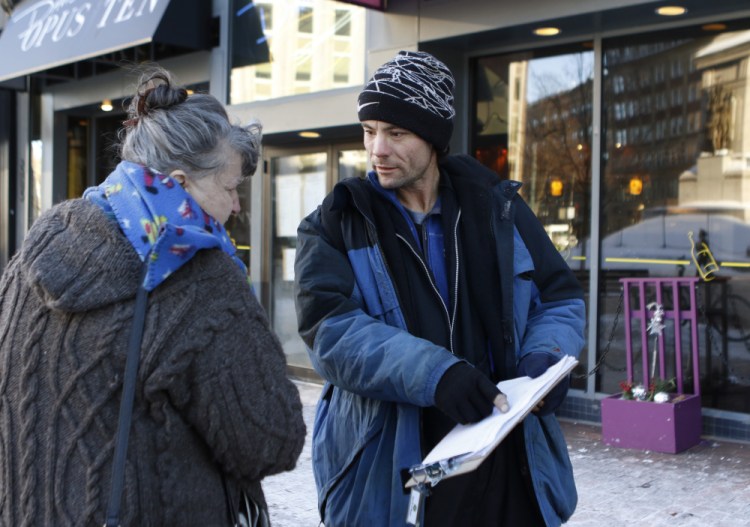AUGUSTA –– The ballot question that asks Maine voters to allow a developer to build a casino in York County is the “poster child” for a citizen’s referendum process run amok, members of the Legislature’s Government Oversight Committee said Wednesday.
The committee’s Senate chairman, Sen. Roger Katz, R-Augusta, said the casino campaign violates the intent of the referendum process, a part of the Maine Constitution meant to give citizens a way to enact laws through a statewide vote if their elected representatives fail to respond to public concerns. He said the committee would explore ideas at its next meeting for reforming the initiative process.
“It is wealthy interests, often from out of state, that are now the movers and negotiators of citizens’ initiatives and we really need to get back to the basics of why we have this process in the first place,” Katz said.
The developer who could build the casino, Shawn Scott, made his first public comments about the project on a radio call-in show Wednesday morning. He told WLOB radio that he would not sell the casino license, as he has done with other projects, if voters approve the measure. Scott funded the successful 2003 referendum campaign to license Hollywood Slots at a horse racing track in Bangor, then sold the license for about $51 million.
The oversight committee took no votes but reviewed the details of how Question 1 got onto the Nov. 7 ballot.
Under the proposal, only Scott or a company he controls can apply for the York County casino license. Supporters say the project, to be built at-a-yet-to-be disclosed location, would create more than 2,000 permanent jobs and generate more than $45 million in annual tax revenue for the state.
The meeting came a day after Gov. Paul LePage urged voters to reject the measure, calling it a “phony deal.” LePage accused the Question 1 campaign of misleading voters with advertising that promises economic benefits without disclosing that a casino would be the source of revenue.
He also said that a casino would merely shift money and jobs away from Maine’s existing casinos in Bangor and Oxford. Most of the candidates running for governor in 2018 have also come out against the measure.
Scott and other backers refused invitations from the committee to attend Wednesday’s meeting and answer questions. Progress for Maine, a PAC supporting the casino question, said in a statement that Scott “has no role in or responsibility to participate” in the committee’s proceedings but would defend his character and record of bringing jobs and economic development to the state. “He is an experienced gaming operator and his view is important for the people to hear,” the PAC statement said.
Katz, the committee chairman, described Scott’s radio appearance as “kind of ironic.”
As the oversight committee ponders its next move, the Commission on Governmental Ethics and Campaign Practices is finishing its investigation into the financing of several ballot question committees formed by Scott’s sister, Lisa Scott, a real estate developer from Miami. She and other out-of-state and international investors bankrolled the $4.3 million signature-gathering campaign that put the casino question on the ballot.
Katz said the ethics commission staff would make its recommendations by Oct. 31 on potential fines against Lisa Scott and others for inaccurate or late reporting of campaign finances.
Katz recounted problems that Shawn Scott has had with casino regulators in five other states and countries and said his attempt to reap profits again here “ought to make Maine peoples’ blood boil.” He said Scott sold the rights to a casino license in Louisiana for $130 million, after spending about $10 million getting a ballot question passed there.
State officials have estimated that a casino in York County would be valued at $150 million to $200 million. In 2003, Scott was behind a ballot measure to create Hollywood Slots, which combined slot machines and harness racing. He then sold his rights to the license to Penn National for about $51 million as state regulators began to scrutinize his companies.
Katz said a suitability study examining whether Scott’s company should hold the casino license came back with “significant issues about the application including the fact that some of the people intimately involved had significant criminal records.”
But Scott said during his radio appearance Wednesday morning that he does not intend to flip the York County casino license.
“We don’t have any intention of cashing out and leaving,” he said. “We want to be here for the long haul, we want to develop this project.”
When pressed about his past history in Maine by show host Ray Richardson, Scott said, “Bangor turned out to be a win-win for everybody and it’s producing still $37 million a year in tax revenue. Sometimes in life businesses don’t work out but in the Bangor case that was a win-win for everyone.”
However, Katz and other oversight committee members said Scott and other casino backers haven’t been straight with Maine voters about who was investing in the casino project and who would benefit from it. They pointed to the complex web of ballot question committees formed by Lisa Scott and her associates, and to the aggressive statewide petition drive, carried out by petitioners who were paid up to $17 for each voter signature they obtained.
Several other committee members echoed Katz’s concerns about how Maine’s initiative process was being used.
“In listening to all of this, it’s become clear to me the grassroots efforts in Maine has become Astroturf,” said Rep. Paula Sutton, R-Warren. Sen. Bill Diamond, D-Windham, said the Question 1 campaign, “underscores what we kind of know and that is the initiative process, the referendum process has now evolved into something far beyond what we ever intended. I think it has become way obvious it has become too easy to manipulate.”
In the last session of the Legislature, lawmakers failed to pass two bills that would have altered the initiative process. One bill would have increased the number of signatures needed to get a question on the ballot, and another would have required an even geographical distribution of signatures from voters in each of the state’s two congressional districts.
Sen. Tom Saviello, R-Wilton, noted that the Legislature can amend any law passed at the ballot box. If Question 1 passes, he said, lawmakers could require a competitive bidding process or even repeal the casino approval entirely.
Scott Thistle can be contacted at 713-6720 or at:
sthistle@pressherald.com
Twitter: thisdog
Send questions/comments to the editors.





Success. Please wait for the page to reload. If the page does not reload within 5 seconds, please refresh the page.
Enter your email and password to access comments.
Hi, to comment on stories you must . This profile is in addition to your subscription and website login.
Already have a commenting profile? .
Invalid username/password.
Please check your email to confirm and complete your registration.
Only subscribers are eligible to post comments. Please subscribe or login first for digital access. Here’s why.
Use the form below to reset your password. When you've submitted your account email, we will send an email with a reset code.